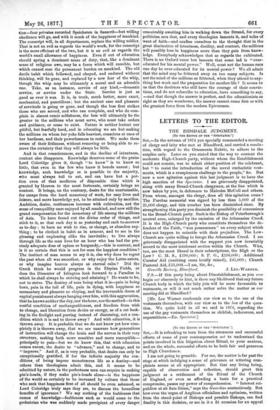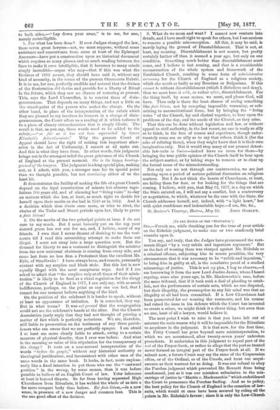(TO THE EDITOR OF THE "SPECTATOR "] SIR,—It is refreshing
to turn from the strenuous and successful efforts of some of your contemporaries not to understand the points involved in this litigation about Ritual, to your anxious, and on the whole, successful efforts to be both fair and generous to High Churchmen.
I am not going to grumble. For me, the matter is far past the stage at which indulging a sense of grievance or uttering com- plaints seems at all appropriate. But that any living being, capable of observation and reflection, should greet this judgment as a settlement of the Ritual of the Church of England, or even as affording a basis for a practical compromise, passes my power of comprehension. "Interest rei- publica ut sit finis litium," says the Guardian sententiously. But how even the organ of Anglican officialism and optimism, written from the stand-point of Bishops and possible Bishops, can find finality in this decision, or see in it a fit occasion for an appeal
to both sides,—" Lay down your arms," is to me, for one, merely unintelligible.
1. For what has been done? If ever Judges changed the law, these seven great lawyers—not, we must suppose, without some assistance and concurrence from some at least of the Episcopal Assessors—have put a construction upon an historical document which requires so many glosses and so much reading between the lines to make it even intelligible, that it becomes to many minds simply incredible—argue who may—that if this was what the Revisers of 1662 meant, they should have said it, without any kind of necessity, in the terms of the present Ornaments Rubric. It is to me, for one, perfectly credible and natural that the divines of the Restoration did devise and provide for a liberty of Ritual in the future, which they saw no chance of restoring at present. This, says the Lord Chancellor, is to convict them of disin- genuousness. That depends on many things, and not a little on the stand-point of the person who makes the charge. On the other hand, in place of the interpretation of the rubric which they are pleased to say involves its framers in a charge of disin- genuousness, the Court offers us a reading of it which reduces it to a piece of clumsy circumlocution that is simply idiotic. The result is that, as you say, these words need to be added to the rubric,—" so far as it has not been superseded by Queen Elizabeth's Advertisements." Why the present Court of Appeal should have the right of making this important alter- ation in the Act of Uniformity, I cannot at all make out. And this is what they have done. In other words, this judgment brings out in the strongest relief the great grievance of the Church of England at the present moment. She is the happy hunting- ground of the lawyers. The judgment is a long special plea, making out, as I admit, with you, a stronger case for its special point than we thought possible, but not convincing either of us the least bit.
It demonstrates the futility of making the life of a great Church depend on the legal construction of minute but obscure regu- lations 300 years old, and of silencing her "living voice" to-day on matters which she has, at least, as much right to decide for herself upon their merits as she had in 1549 or in 1662. And is a decision which thus rivets once more, or tries to rivet, the chains of the Tudor and Stuart periods upon her, likely to prove &finis litium?
2. On the merits of the two principal points at issue I do not care to say much. But I must honestly put on the cap your shrewd guess has cut out for me, and, I believe, many of my friends. I own that I never dreamt of desiring to use the vest- ments till I read this astonishing attempt to make them out illegal. I must not stray' into a large question now. But the demand for liberty to use a vestment to distinguish the minister from the now universal choirman is coming from every side, and came last from no less firm a Protestant than the excellent Mr. Ryle, of Stradbroke ! I have always been, and remain, personally content with my surplice and black stole. But this last is now equally illegal with the most sumptuous cope. And if I am asked to admit that "the surplice only at all times of their minis- tration" is likely to be final as a ritual regulation for the clergy of the Church of England in 1877, I can only say, with as much indifference, perhaps, on the point as any one can feel, that I cannot for one moment believe anything of the kind.
On the position of the celebrant it is harder to speak, without at least an appearance of irritation. It is conceded, they say. But in what terms? It was not proved that the congregation could not see the celebrant's hands at the altar. But the Church Association justly reply that they had not thought of proving a matter of fact which is perfectly notorious. We are, therefore, still liable to prosecution on the testimony of any three parish- ioners who can swear that we are perfectly opaque. I am afraid I at least am more clearly liable to attack, owing to a certain measure of physical density, than I ever was before. And what is the meaning or value of this stipulation for the transparency of the clergy? It rests on a non-natural interpretation of the words "before the people," without any historical authority or theological justification, and inconsistent with other uses of the same words in the same book. It looks, in fact, more uspleaa- antly like a fixed intention to put those who use the "eastward position" in the wrong, by some means, than it was before possible to believe of an English Court of law. YO'ar inference at least is beyond dispute. So far from having separated High Churchmen from Ritualists, it has welded the whole of us into a far more compact body than before. Est finis litium,—in a new sense, in presence of a new danger and common foes. This is the one good effect of the decision. 3. What do we mean and want? I cannot now venture into details, and I have small right to speak for others, but lam anxious to remove a possible misconception. All this, it may be said, is merely laying the ground of Disestablishment. That is not, at least, my meaning. Diseatablishment is not nearer, but pretty certainly farther off than it seemed a year ago, but only on one condition. Something much better than disestablishment must come, and I believe is fast coming, and that is a considerable reconstruction of the whole system and framework of the Established Church, resulting in some form of administrative autonomy for the Church of England as a religious society, which she needs as badly as any Bosnians or Bulgarians. If this cannot be without disestablishment (which I disbelieve and deny), then we must have it with, or rather after, disestablishment. For the thing itself, by some means, we must, and please God, will have. Thus only is there the least chance of seeing something like finis litium, not by accepting impossible reasoning, or sub- mitting to unconstitutional force, but by bringing the " living voice " of the Church, lay and clerical together, to bear upon the problems of the day, and the needs of the Church, as they arise.
That this can be done without legislation and law, or without - appeal to civil authority, in the last resort, no one is really so silly as to think, in the face of reason and experience, though unfor- tunately some are so silly as to say that others think it (for the sake of refuting them), when they might know that it is their own imagination only. But it would stop many of our present detest- able law-suits in limine—indeed leave no room for them—by bringing the true public opinion of the Church itself to bear upon the subject-matter, or by taking steps to remove or to clear up the formal cause of the misunderstanding.
Not only are we not through our controversies, we are just entering upon a period of serious political discussion on religious matters. But I do not think the hearts of Churchmen, at least, are failing them for fear, or for looking for the things that are coming. I believe, with you, that May 12, 1877, is a day on which the State entered on, I will not say a conflict, but a controversy or negotiation, to which, whatever be the case with the State, the Church addresses herself, not, indeed, with "a light heart," but with quiet confidence and indomitable hope.—I am, Sir, &c.,
St. Saviour's Vicarage, Horton, May 22. Jon x OAKLEY..



































 Previous page
Previous page